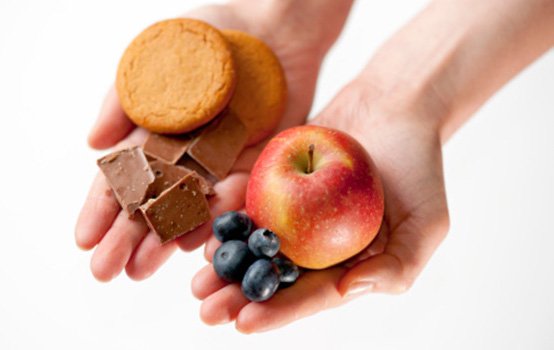Scientists Reveal How to ‘Train Your Brain’ to Eat Healthy

 Are you a junk-food addict? Do you want to eat better, but don’t know how? No this isn’t some slimy advertisement! Some inspiring news, a study from Tufts University suggests that your brain can be trained to prefer healthful foods over high-calorie, nutrition-less junk foods, even if eating poorly is a long-standing habit.
Are you a junk-food addict? Do you want to eat better, but don’t know how? No this isn’t some slimy advertisement! Some inspiring news, a study from Tufts University suggests that your brain can be trained to prefer healthful foods over high-calorie, nutrition-less junk foods, even if eating poorly is a long-standing habit.
By scanning the brains of both women and men, researchers found that people don’t start out craving french fries, pizza, and cookies while abhorring fresh vegetables and organic fruit. According to Professor Susan B. Roberts, senior study author and behavioral nutrition scientist at the Boston university, that habit is formed over years.
She says:
“This conditioning happens over time in response to eating – repeatedly – what is out there in the toxic food environment.”
Scientists have found that, for example, that eating refined sugar or high fructose corn syrup repeatedly sets up an addiction in the brain and body that is as strong as those addicted to cocaine! While it can be very difficult to undo an addiction to food of this kind once it is set up, it is indeed possible.
Prof Roberts’ research, published in the journal Nutrition & Diabetes, proposes that the brain can learn to like healthful foods, and abstain from the ones that cause obesity, high blood pressure, diabetes, heart disease, and other health conditions.
Roberts and her team studied the part of the brain linked to reward and addiction in 13 overweight and obese men and women, eight of whom were taking part in a specially designed weight-loss regime. She found that each of them could re-train their brains to like healthful food.
The key is to remain vigilant long enough to overturn the older, bad habit of eating poorly. Participants in the study were given diets high in fiber and protein to keep them satiated, and by watching their brain scans using MRI to monitor their progress, the researchers were able to successfully reverse the cravings in the participants so that they were actually craving healthful food instead of the unhealthy junk by the end of the process.
Read: Brain Scans Reveal that Processed Foods ARE Addictive
Comparing the scans taken before and after the program, the team saw a significant shift in reward center activity away from high-calorie toward low-calorie foods in the group that followed the program. Though the study involved few participants, and it needs to be expanded, it suggests that the brain is ‘plastic’ and can be re-trained to like what is good for the body. No food addiction is therefore, incurable.
Scans of the brain’s reward centre showed that food preferences had changed. This focused on changing food preferences by prescribing a diet high in fier and protein, and low in carbohydrates, but which did not allow participants to become hungry since that is when food cravings takeover and unhealthful food becomes attractive.

Continue reading the main story
“When their brains were scanned using MRI at the start and end of a six-month period, those following the programme showed changes in the brain’s reward centre.
When participants were shown pictures of different types of food, it was the healthy, low-calorie foods which produced an increased reaction.The study said this indicated an increased reward and enjoyment of healthier food.
The brain’s reward centre also showed decreased sensitivity to the unhealthy, higher-calorie foods.
The Boston researchers say that gastric bypass surgery, while solving the problem of weight loss, can take away food enjoyment rather than make healthier foods more appealing.
‘There is much more research to be done here, involving many more participants, long-term follow-up and investigating more areas of the brain,’ Prof Roberts said.”
